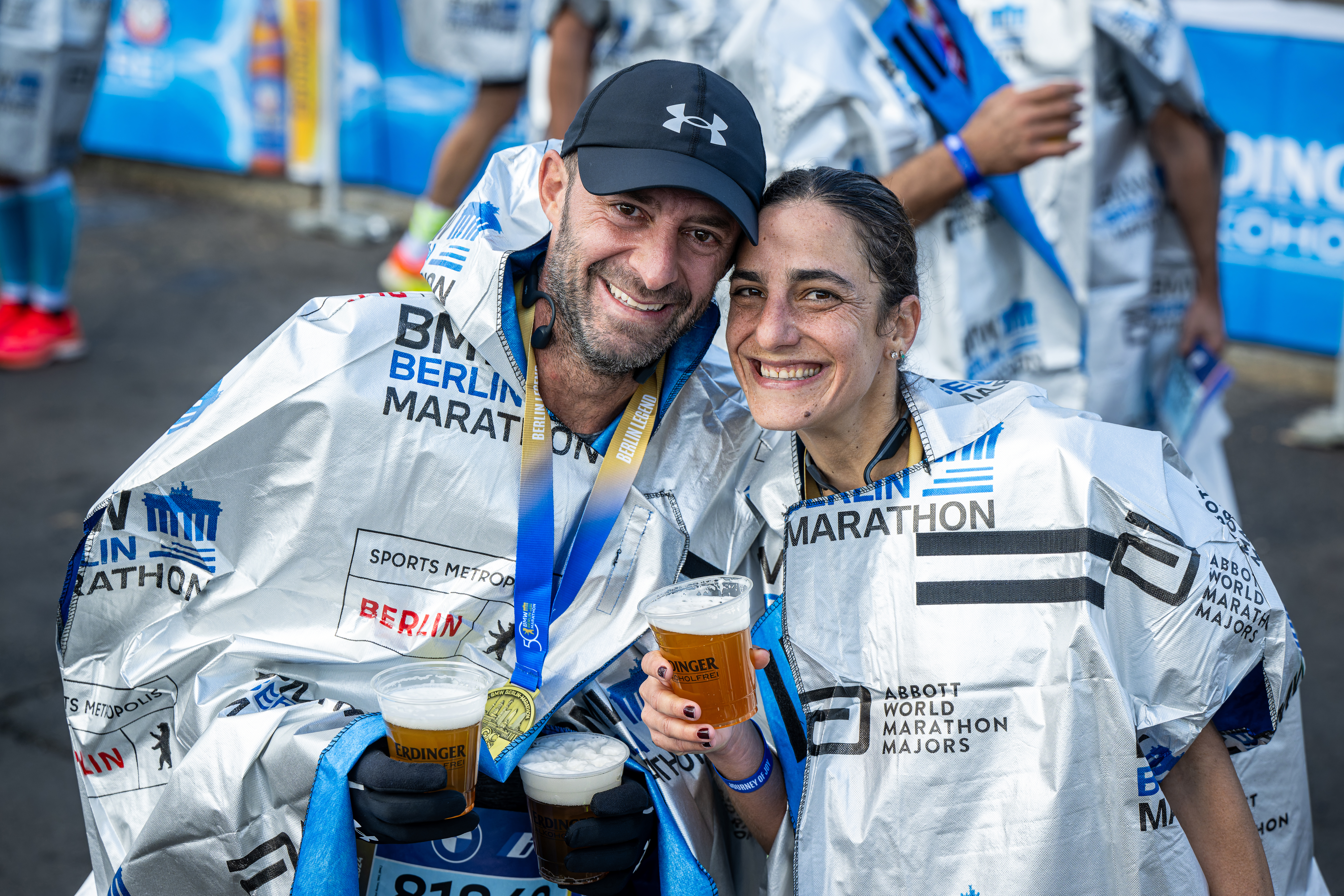Open-Window Effect: Is your immune system more vulnerable after training?
Scientists have long suspected that elite endurance athletes are more prone to upper respiratory infections. A striking pattern has emerged: acute infections often occur after intense exertion, demanding training phases, or competitions. One possible explanation for this phenomenon is the Open-Window Effect.

Exhausted and happy at the finish line of the BMW BERLIN-MARATHON 2024. © SCC EVENTS/Tilo Wiedensohler
What’s Behind It?
The Open-Window Effect is a scientific hypothesis that has yet to be definitively proven. It describes a timeframe of up to 24 hours after intense physical exertion in which the immune system is temporarily weakened. A stressed mucosal epithelium in the upper respiratory tract can impair the body's first line of defense—making it easier for pathogens to enter.
Additionally, immune cell levels fluctuate: during exercise, the number of lymphocytes increases in proportion to the intensity and duration of the workout. However, in the initial hours of recovery, their levels drop below baseline before stabilizing again within 24 hours. Besides exercise, factors like sleep, nutrition, and psychological stress also impact immune function.

These two participants protect themselves with the reusable poncho at the finish line. © SCC EVENTS /Tilo Wiedensohler
How Can You Protect Yourself?
To stay healthy, make sure to change into dry clothes quickly after training, get enough sleep, and manage stress effectively. This helps strengthen your immune defenses! And if you do catch a cold, don’t worry—adults typically experience four to five mild infections per year. The good news: endurance training boosts your immune system, but proper recovery is an essential part of the process.
Related News










BMW

BMW GERMANY - A STRONG PARTNER FOR RUNNING.
BMW has been the title sponsor of Germany's biggest marathon since 2011. At this running event, the world's elite come together to top the current best times.
Strength. Endurance. Efficiency. These are not only the most important attributes of a runner, but also apply to BMW's sustainable vehicles. BMW has been setting standards in sustainability for years and successfully demonstrates them at the BMW BERLIN MARATHON. But also before the event BMW accompanies the running community in their preparation and emphasizes the joy of running. With the perennial RUN FOR JOY campaign, BMW, supports the athletes in their preparation - together they make the impossible possible. The lead vehicle, the new BMW i5 supports the runners on the course. It has exactly the qualities needed for a successful marathon run: intelligent and responsible use of resources. And it is precisely with these skills that the all-electric vehicle guides the runners safely, purposefully and in an environmentally friendly manner through the capital.
More than 50 vehicles and around 15 scooters of the C evolution class are part of the fleet of support vehicles provided by BMW for the BMW BERLIN-MARATHON. In addition to the iX as a safety car, the latest i-models from the car manufacturer are also in use as shuttle and organization vehicles. With this commitment, BMW supports the sustainable development of modern technology and the sport of running.
adidas

Everything at adidas reflects the spirit of our founder, Adi Dassler. Improving the athlete’s performance was his goal; today, his legacy continues with the consumer at the heart of everything the adidas brand does.
The number of runners in Germany is constantly increasing. No matter where they come from, they all have the same goal: Improve. Better runners, better athletes and in the end a better version of themselves.
adidas Running has something for everyone – we want help each person achieve their individual goals. What counts is personal development, which goes far beyond the personal best.
Abbott

At Abbott, our 114,000 employees in more than 160 countries are devoted to advancing life-changing technologies that help people achieve their full potential. Our medical devices, diagnostic tools and nutrition products are designed to enable individuals to reach their personal best, however they define it. By sponsoring the Abbott World Marathon Majors, a series of the six largest and most renowned marathons in the world, including the BMW BERLIN-MARATHON, we are not just celebrating the pinnacle of physical endurance and determination – we are reinforcing our commitment to improving lives. The Abbott World Marathon Majors are a testament to health and the human spirit at their finest, showcasing that with the right support and determination, every finish line is within reach.
More on Facebook at www.facebook.com/Abbott and on Twitter @AbbottNews and @AbbottGlobal.
Zalando

Are you ready to take your running to the next level? As the official sponsor of the BMW BERLIN-MARATHON, Zalando is here to help you reach your goals. Running a marathon is challenging enough - you need the right equipment to feel completely comfortable. Our functional sportswear can do much more than just look good: From marathon training to relaxed runs - find your perfect outfit at Zalando and run with us!
GENERALI

Generali Germany has been our partner since 2018. The insurance group is part of the international Generali Group and thus also part of a company that is over 190 years old, its history and its heritage. In 2017, the company launched a new sponsorship strategy - “Generali moves Germany”.
The initiative aims to motivate people to lead active health and environmentally conscious lives. Taking part, not watching, is crucial here. In recent years, Generali has thus become one of the largest and most important sponsors in German running. Running promotes physical and mental health and thus has a preventive effect against numerous common diseases. Moreover, hardly any other sport can be practiced in such a resource-saving and environmentally friendly way. Together with the event organizers, Generali develops programs that make major events demonstrably sustainable: in the areas of environmental and climate protection and social commitment.
About 9 million customers are insured with the companies of Generali Germany, which include the brands Generali, CosmosDirekt and Dialog in the life, health and property/casualty segments. Generali's objective is to be a lifetime partner for its customers, offering innovative, individual solutions and services thanks to an excellent sales network in exclusive and direct sales as well as in the broker channel. Generali Germany is part of the "Germany, Austria and Switzerland" (DACH) business unit, which was newly created in 2022.
ERDINGER Alkoholfrei

ERDINGER Alkoholfrei refreshes all finishers behind the finish line. ERDINGER Alkoholfrei is the ideal beverage after sports: isotonic, rich in vitamins, and low in calories. And ERDINGER Alkoholfrei has only 125 kcl per 0.5-liter bottle! Because a varied and balanced diet and a healthy lifestyle are important!
EY

As official Partner and Sustainability Consultant of the BMW BERLIN MARATHON, EY aims to further advance the sustainable transformation in sports. To this end and together with the event organizer SCC Events, EY will develop a concept to make the marathon as sustainable as possible.
Also beyond the course, we go the extra mEYle every day: EY is one of the major German professional services organizations with more than 11,000 employees at 20 locations. Working across Assurance, Consulting, Law, Tax, Strategy and Transactions, EY teams ask better questions to find new answers for the complex issues facing our world today.
This includes EY helping clients to develop and implement suitable sustainability concepts. In addition, EY has many years of experience in advising companies and organizations in sports.
NORQAIN

NORQAIN – Official Timekeeper of BMW BERLIN-MARATHON
Embrace the thrill of precision and endurance with NORQAIN at the iconic BMW BERLIN-MARATHON. As the proud Official Timekeeper, family-owned and fully independent NORQAIN exemplifies a commitment to quality watchmaking and its challenger “my life, my way” spirit.
Just as runners push their limits on the track, NORQAIN's timepieces stand strong against the test of time, making every second count in the pursuit of excellence. At the heart of our collection lies the revolutionary Wild ONE collection. Crafted to endure the most demanding challenges, this ultimate high-performance sports watch is both ultra-robust and ultra-light making it a perfect companion for athletes and watch enthusiasts alike.
We’re beyond excited to announce that as a special tribute to celebrate the 50th anniversary of the iconic BMW BERLIN-MARATHON NORQAIN will be unveiling a limited edition Wild ONE BMW BERLIN-MARATHON timepiece in 2024.
Maurten

You probably know that you burn carbohydrates when you run – both in training and during the race. And how hard it can be getting the fueling right, without GI-distress.
Our Hydrogel Technology makes sure you get enough carbohydrates without risking the session or race. But there are no shortcuts – science has shown that training your guts makes a huge difference.
VILSA

Naturality meets sustainability
As a mineral water, VILSA accompanies you with refreshing purity and light mineralisation. But that's not all! We are committed to people, animals and the environment: as a family-owned, midsized company in its fourth generation, we see it as an obligation and the core of our company philosophy to stand up for nature and the conservation of our resources in order to preserve them for future generations.
Discover our variety of products and enjoy the natural freshness of VILSA.

























![[Translate to Englisch:] [Translate to Englisch:]](/fileadmin/_processed_/4/1/csm_Vater-Sohn-Freude_f8a7e6bd65.jpg)

